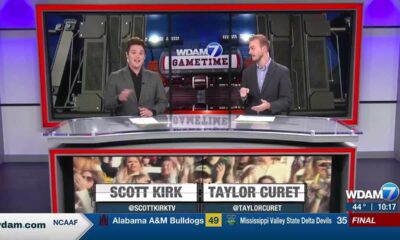Mississippi Today
PHOTOS: Bridging language barriers through interpreter training


Ridgeland — In Mississippi, where an estimated 35,800 residents face language barriers in health care, a recent event trained professionals to communicate more effectively with limited-English-speaking patients in an effort to bridge gaps in care.
The program, which began on Oct. 2, was organized by the Mississippi Department of Health’s Office of Health Disparity Elimination and the Bureau of Language Access. It served as a step toward improving access to essential services for Limited English Proficient (LEP) individuals.
“Interpreters are fundamental in ensuring that every individual can fully understand and access the services they need,” said Selma Alford, director of the Bureau of Language Access. “The training is rigorous and essential; it focuses on ethics, cultural competency, and the ongoing development of interpreters’ skills to meet diverse community needs.”
The training program covered a variety of topics essential for effective interpreting, including medical terminology, ethics, and cultural competency, equipping interpreters with the skills necessary for their roles. Each day of training featured interactive sessions, role-playing exercises, and discussions of real-world scenarios. Participants also engaged in exercises focused on building trust with clients and addressing the nuances of communication in health care settings.
Attendees included medical interpreters, court interpreters, teachers and community health workers, among others.
Gabrielle Miller, a housing case manager with the Gulf Coast Center for Nonviolence, attended to enhance her capacity to serve the Spanish-speaking population.
“I studied social work and Spanish in undergrad, and I’ve lived in Spanish-speaking countries. Now I’m back here working in the Gulf Coast … There aren’t that many people working in social services who can speak Spanish and interpret for those in the community. So I think it’s really important to come get my certification so that I can better serve the community that I live in,” Miller said. “… Some of my clients are solely Spanish-speaking, so advocating for them within my role is crucial.”
According to data from the Migration Policy Institute, approximately 1.2% of Mississippians are considered Limited English Proficient (LEP), meaning they speak English less than “very well.” The top five languages spoken by these individuals in Mississippi are Spanish, Vietnamese, Arabic, Chinese, and Gujarati. While about 96% of people in the state speak only English, 3.8% speak a language other than English.” This data underscores the critical need for trained interpreters to facilitate access to essential services.
The training also emphasized the risks of using children or family members as interpreters, which can lead to miscommunication.
“Misunderstandings can have life-threatening consequences, especially in medical settings,” Alford said.
Alford and Miller reiterated the need for credentialing and ongoing education to ensure interpreters can effectively support their communities and provide equitable access to critical services.
Alford urged community members to recognize the importance of professional interpreters as the need for effective communication in health care and social services continues to grow.
“Every voice matters. We encourage anyone interested in making a difference to pursue certification and help us build a more inclusive Mississippi,” she said.
Participants in the training received certificates of completion, signifying their readiness to serve as professional interpreters.











This article first appeared on Mississippi Today and is republished here under a Creative Commons license.![]()
Mississippi Today
An ad supporting Jenifer Branning finds imaginary liberals on the Mississippi Supreme Court

The Improve Mississippi PAC claims in advertising that the state Supreme Court “is in danger of being dominated by liberal justices” unless Jenifer Branning is elected in Tuesday’s runoff.
Improve Mississippi made the almost laughable claim in both radio commercials and mailers that were sent to homes in the court’s central district, where a runoff election will be held on Tuesday.
Improve Mississippi is an independent, third party political action committee created to aid state Sen. Jenifer Branning of Neshoba County in her efforts to defeat longtime Central District Supreme Court Justice Jim Kitchens of Copiah County.
The PAC should receive an award or at least be considered for an honor for best fiction writing.
At least seven current members of the nine-member Supreme Court would be shocked to know anyone considered them liberal.
It is telling that the ads do not offer any examples of “liberal” Supreme Court opinions issued by the current majority. It is even more telling that there have been no ads by Improve Mississippi or any other group citing the liberal dissenting opinions written or joined by Kitchens.
Granted, it is fair and likely accurate to point out that Branning is more conservative than Kitchens. After all, Branning is considered one of the more conservative members of a supermajority Republican Mississippi Senate.
As a member of the Senate, for example, she voted against removing the Confederate battle emblem from the Mississippi state flag, opposed Medicaid expansion and an equal pay bill for women.
And if she is elected to the state Supreme Court in Tuesday’s runoff election, she might be one of the panel’s more conservative members. But she will be surrounded by a Supreme Court bench full of conservatives.
A look at the history of the members of the Supreme Court might be helpful.
Chief Justice Michael Randolph originally was appointed to the court by Republican Gov. Haley Barbour, who is credited with leading the effort to make the Republican Party dominant in Mississippi. Before Randolph was appointed by Barbour, he served a stint on the National Coal Council — appointed to the post by President Ronald Reagan who is considered an icon in the conservative movement.
Justices James Maxwell, Dawn Beam, David Ishee and Kenneth Griffis were appointed by Republican Gov. Phil Bryant.
Only three members of the current court were not initially appointed to the Supreme Court by conservative Republican governors: Kitchens, Josiah Coleman and Robert Chamberlin. All three got their initial posts on the court by winning elections for full eight-year terms.
But Chamberlin, once a Republican state senator from Southaven, was appointed as a circuit court judge by Barbour before winning his Supreme Court post. And Coleman was endorsed in his election effort by both the Republican Party and by current Republican Gov. Tate Reeves, who also contributed to his campaign.
Only Kitchens earned a spot on the court without either being appointed by a Republican governor or being endorsed by the state Republican Party.
The ninth member of the court is Leslie King, who, like Kitchens, is viewed as not as conservative as the other seven justices. King, former chief judge on the Mississippi Court of Appeals, was originally appointed to the Supreme Court by Barbour, who to his credit made the appointment at least in part to ensure that a Black Mississippian remained on the nine-member court.
It should be noted that Beam was defeated on Nov. 5 by David Sullivan, a Gulf Coast municipal judge who has a local reputation for leaning conservative. Even if Sullivan is less conservative when he takes his new post in January, there still be six justices on the Supreme Court with strong conservative bonafides, not counting what happens in the Branning-Kitchens runoff.
Granted, Kitchens is next in line to serve as chief justice should Randolph, who has been on the court since 2004, step down. The longest tenured justice serves as the chief justice.
But to think that Kitchens as chief justice would be able to exert enough influence to force the other longtime conservative members of the court to start voting as liberals is even more fiction.
This article first appeared on Mississippi Today and is republished here under a Creative Commons license.![]()
Mississippi Today
On this day in 1968


Nov. 24, 1968

Black Panther leader Eldridge Cleaver fled the U.S. to avoid imprisonment on a parole violation. He wrote in “Soul on Ice”: “If a man like Malcolm X could change and repudiate racism, if I myself and other former Muslims can change, if young whites can change, then there is hope for America.”
The Arkansas native began to be incarcerated when he was still in junior high and soon read about Malcolm X. He began writing his own essays, drawing the praise of Norman Mailer and others. That work helped him win parole in 1966. His “Soul on Ice” memoir, written from Folsom state prison, described his journey from selling marijuana to following Malcolm X. The book he wrote became a seminal work in Black literature, and he became a national figure.
Cleaver soon joined the Black Panther Party, serving as the minister of information. After a Panther shootout with police that left him injured, one Panther dead and two officers wounded, he jumped bail and fled the U.S. In 1977, after an unsuccessful suicide attempt, he returned to the U.S. pleaded guilty to a reduced charge of assault and served 1,200 hours of community service.
From that point forward, “Mr. Cleaver metamorphosed into variously a born-again Christian, a follower of the Rev. Sun Myung Moon, a Mormon, a crack cocaine addict, a designer of men’s trousers featuring a codpiece and even, finally, a Republican,” The New York Times wrote in his 1998 obituary. His wife said he was suffering from mental illness and never recovered.
This article first appeared on Mississippi Today and is republished here under a Creative Commons license.![]()
Mississippi Today
On this day in 1867


Nov. 23, 1867

The Louisiana Constitutional Convention, composed of 49 White delegates and 49 Black delegates, met in New Orleans. The new constitution became the first in the state’s history to include a bill of rights.
The document gave property rights to married women, funded public education without segregated schools, provided full citizenship for Black Americans, and eliminated the Black Codes of 1865 and property qualifications for officeholders.
The voters ratified the constitution months later. Despite the document, prejudice and corruption continued to reign in Louisiana, and when Reconstruction ended, the constitution was replaced with one that helped restore the rule of white supremacy.
This article first appeared on Mississippi Today and is republished here under a Creative Commons license.![]()
-

 Kaiser Health News6 days ago
Kaiser Health News6 days agoA Closely Watched Trial Over Idaho’s Near-Total Abortion Ban Continues Tuesday
-

 Local News5 days ago
Local News5 days agoSherral’s Diner to be featured on America’s Best Restaurants
-

 News from the South - Georgia News Feed4 days ago
News from the South - Georgia News Feed4 days agoJose Ibarra found guilty in murder of Laken Riley | FOX 5 News
-

 News from the South - Alabama News Feed5 days ago
News from the South - Alabama News Feed5 days agoTrial underway for Sheila Agee, the mother accused in deadly Home Depot shooting
-

 News from the South - Kentucky News Feed4 days ago
News from the South - Kentucky News Feed4 days agoNicholasville organization activates weather plan in response to bitter cold temperatures
-

 News from the South - Alabama News Feed3 days ago
News from the South - Alabama News Feed3 days agoJudge grants mistrial in Sheila Agee trial due to ‘unhinged juror’
-

 Local News2 days ago
Local News2 days agoIntroducing our Student Athlete of the Week: Ocean Springs’ very own Mackenzie Smith
-

 News from the South - Alabama News Feed4 days ago
News from the South - Alabama News Feed4 days agoAlabama's weather forecast is getting colder, and a widespread frost and freeze is likely by the …

























